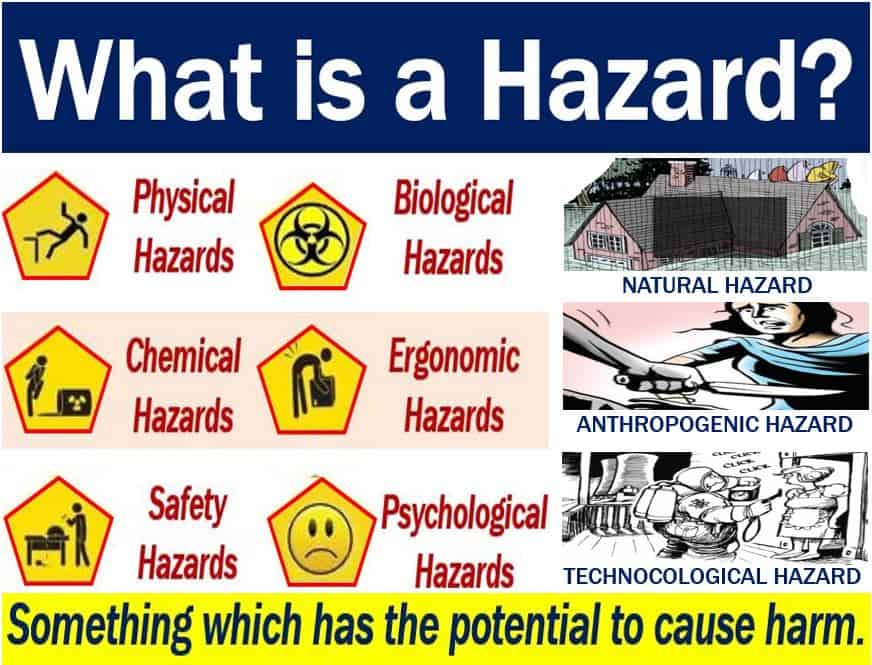A Hazard is a risk, danger, chance, or probability. In all cases, the meanings relate to unpleasant things occurring. As a verb, the word means to say something in a tentative way. For example, if I say “I hazard a guess,” it means I tentatively offer a guess. The verb may also mean to put something at risk of becoming lost. For example, “Horse-racing is too risky a business on which to hazard money.”
Hazards are things that might be dangerous to your health, safety, reputation, plans, etc.
The following newspaper headline – ‘The hazards of crossing the road’ – refers to the possible dangers we face when crossing the road. For example, we could be hit by a car or knocked down by another pedestrian.

Hazard – insurance
In the world of insurance, the term refers to a situation or condition that increases the chance of loss. Specifically, a loss for the insured.
Physical hazards are things in the environment that could alter the probability of a loss. The term also includes things in the environment that may alter the severity of a loss.
For the insurance companies, ‘alter’ usually refers to ‘increase.’
The term ‘moral hazards‘ refers to the ethical conduct or attitude of the insured. In most cases, these hazards are unavoidable. Therefore, the insurer typically does not insure the risk.
Increased hazard is a situation that raises the risk that something undesirable, dangerous, or unpleasant will happen to property or a person. It is an insurance term.
Hazard vs. risk
Although the two terms have similar meanings and we often use them interchangeably, they are not the same. In fact, regarding risk assessment, risks and hazards are very different.
Hazards are things that can cause damage to, for example, people, animals, property, or the environment.
Risk refers to the probability that exposure to a hazard will occur and lead to a negative consequence.
In other words, a hazard poses no risk if you do not expose yourself to it.
Classifying hazards
We can classify hazards in many different ways. For example, we may specify the hazard’s origin. Perhaps there is stored energy which can cause damage if that energy gets out.
Stored energy exists in many forms, such as mechanical, thermal, radioactive, electrical, or chemical.
We sometimes classify hazards according to situations. Examples include oxygen-depleted atmospheres, repetitive movements, and protruding or low-hanging objects.
- Natural
A natural hazard is an extreme event. This event occurs naturally and causes harm to property, humans, possessions, etc.
For example, hurricanes, volcanic eruptions, earthquakes, and extremely cold or hot weather are natural hazards. Floods are also natural hazards.
-
Anthropogenic
Something that humans cause is anthropogenic, i.e., it is man-made. Therefore, anthropogenic hazards are unpleasant or dangerous things that we cause.
For example, murder, civil disorder, terrorism, and war are anthropogenic hazards. We also include some fires, industrial spillages, and power outages in this category.
While natural hazards are often beyond human control and difficult to predict, anthropogenic hazards can be mitigated through policy, planning, and technology.
Anthropogenic hazards, unlike natural ones, can sometimes be exacerbated or reduced by changes in human behavior, technology, and environmental management practices.
-
Technological
Technological hazards are also related to things that humans cause. However, the term is more specific.
Examples include nuclear radiation, dam failures, technological accidents, chemical spills, some explosions, and industrial pollution.
More Specific Classifications
Hazards can be categorized with greater precision. Below are five such specific examples:
-
Biological Hazards
Agents that can cause disease or health concerns in living organisms, such as bacteria, viruses, insects, plants, birds, animals, and humans.
-
Ergonomic Hazards
Workplace conditions that risk injury to the musculoskeletal system, such as improper desk height, poor posture, and repetitive motions.
-
Chemical Hazards
Substances causing potential harm through contact or exposure, such as acids, bases, flammable materials, and pesticides.
-
Psychosocial Hazards
Work-related stressors that affect mental health and well-being, such as bullying, excessive workloads, and lack of support.
-
Environmental Hazards
Elements that threaten the natural environment and human health, such as pollution, deforestation, and climate change.
Etymology of ‘hazard’
Etymology is the study of the origin of words and how their meanings evolved over time.
According to etymonline.com, the English term ‘hazard’ emerged in the English language in the thirteenth century as the name of a game of dice.
-
French
Some etymologists believe it originated from the French term ‘hasard, hasart,’ which was a ‘game of chance played with dice.’
-
Spanish
Others, however, believe that it may have come from the Spanish word ‘azar,’ which meant ‘an unfortunate card’ or ‘throw at dice.’ Today, ‘azar’ in Spanish means chance, luck, or bad luck. In modern Spanish, the term ‘juegos de azar’ means ‘games of chance‘ (betting/gambling).
-
Arabic
The Spanish and French terms probably came from Arabic. In old Arabic, a die (singular of dice) was ‘az-zahr’.
